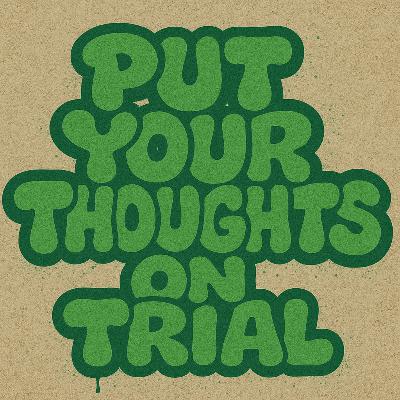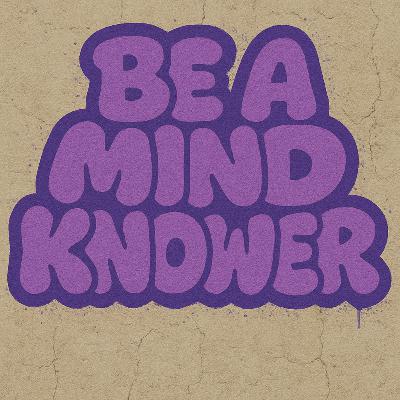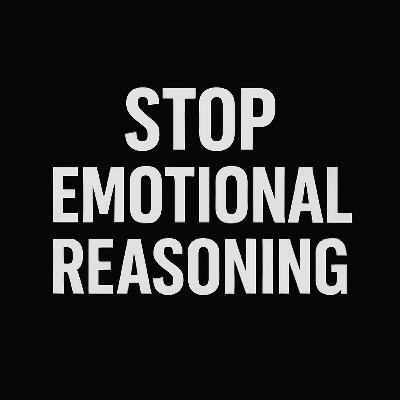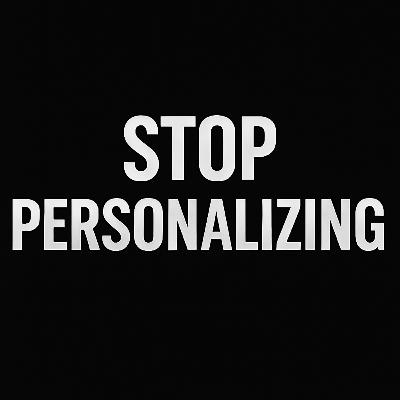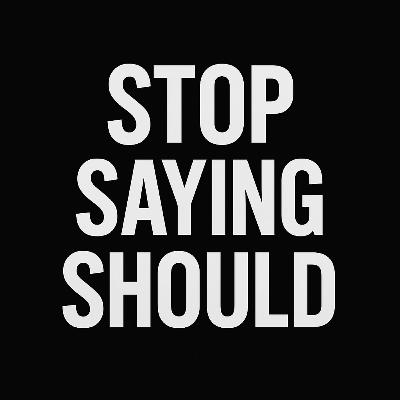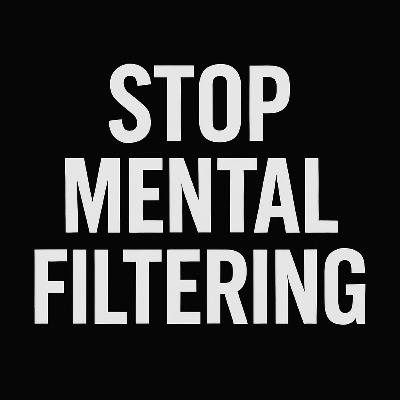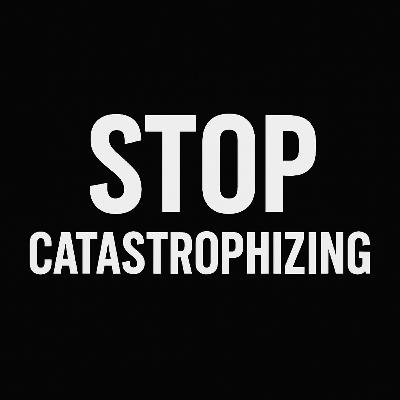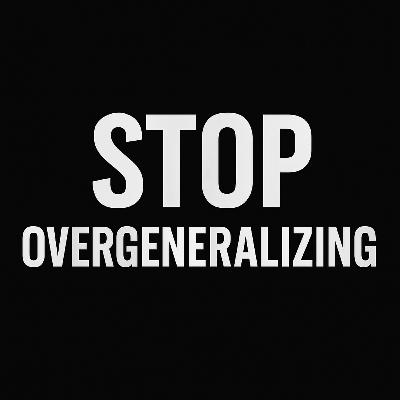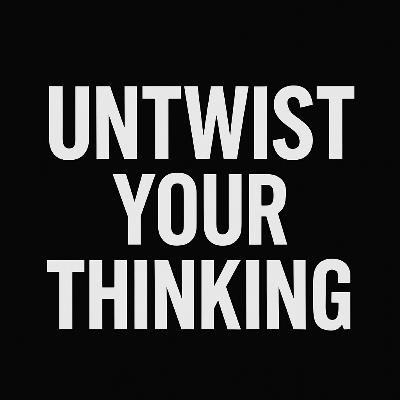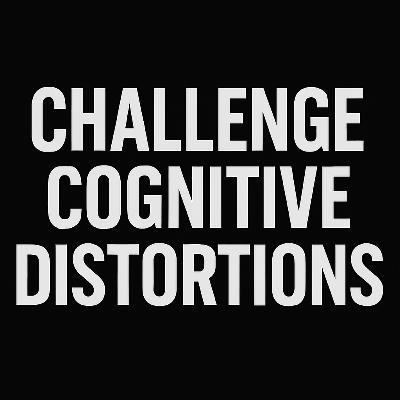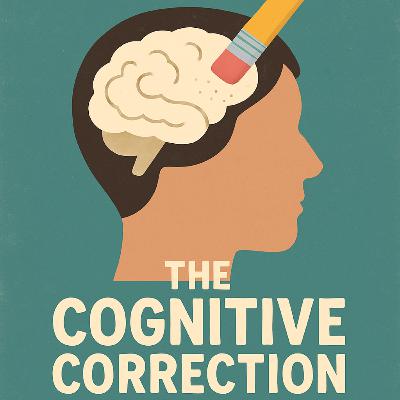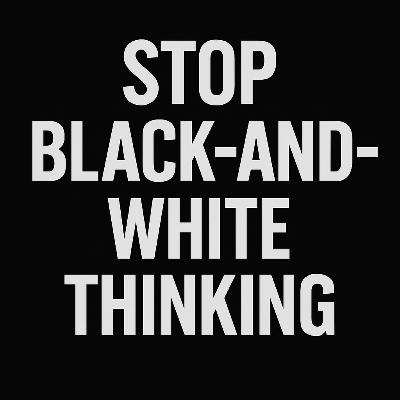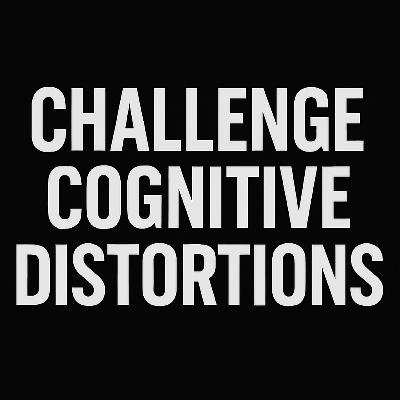Discover The Cognitive Correction
The Cognitive Correction

The Cognitive Correction
Author: Manchoon Samchoon
Subscribed: 6Played: 28Subscribe
Share
© Manchoon Samchoon
Description
The Cognitive Correction dives deep into the world of your thoughts, shining a light on common cognitive distortions – those sneaky mental traps that can skew your perspective and impact your well-being. Learn practical strategies and tools to identify, challenge, and ultimately correct these unhelpful thinking patterns. As you gain clarity and control over your thoughts, we also provide crucial, evidence-based information and expert insights on how to safely and responsibly taper off mental health medications when the time is right, always in close consultation with your healthcare provider.
19 Episodes
Reverse
In this episode, we delve into two common cognitive distortions that can fuel anxiety, depression, and relationship strain: Fortune Telling. These are errors in thinking, or mental shortcuts, where we jump to negative conclusions, often without sufficient evidence.Fortune Telling involves habitually predicting negative outcomes without good evidence, treating these assumptions as fact. Examples include believing you will fail an exam or not get a job before it happens. This distortion robs you of emotional stability, increases anticipatory anxiety and self-doubt, and can lead to feelings of hopelessness. It's harmful because it feels convincing and can prevent you from feeling hopeful or motivated, potentially leading to self-sabotage. Predicting the worst without evidence can also damage relationships by preventing potential growth.Fortunately, these distorted thinking patterns can be challenged through techniques like Cognitive Restructuring, a core process in Cognitive Behavioral Therapy (CBT). We'll explore methods to help you identify and challenge these thoughts, such as:Examining the factual evidence that supports or contradicts your negative prediction or assumption.Testing your thoughts and predictions through real-world "experiments".Asking yourself what the thought really means or if you could be misinterpreting the evidence.Considering alternative, more realistic or balanced outcomes.Using tools like thought records to systematically identify and challenge your thoughts.Works CitedAnderson, R., et al. "Module 5: Overcoming Negative Predictions, Avoidance & Safety Behaviours." Building Body Acceptance: Overcoming Body Dysmorphic Disorder. Centre for Clinical Interventions, Nov. 2012, cci.health.wa.gov.au/resources/looking-after-yourself/body-image/building-body-acceptance/module-5. Accessed 25 May 2024.Bonfil, Albert. "Cognitive Distortion: Fortune Telling in Anxiety and Depression and Relationships." Cognitive Behavioral Therapy Los Angeles, 5 Mar. 2025, cogbtherapy.com/cognitive-distortion-fortune-telling-anxiety-depression-relationships. Accessed 25 May 2024.---. "Cognitive Distortions: Mind Reading." Cognitive Behavioral Therapy Los Angeles, 5 May 2025, cogbtherapy.com/cognitive-distortions-mind-reading. Accessed 25 May 2024.Kos, Blaž. "Fortunetelling, mind reading and jumping to conclusions." Blaz Kos - Performance Coaching, 2025, www.blazkos.com/fortunetelling-mind-reading-and-jumping-to-conclusions/. Accessed 25 May 2024.lucas19, charles. "Jumping to Conclusions: The Relationship Kryptonite." Lucas Counseling Group, Lucas Counseling Group, 25 Oct. 2019, www.lucascounselinggroup.com/blog/jumping-to-conclusions-the-relationship-kryptonite. Accessed 25 May 2024.McKelvey, JD. "Journaling Negative Thoughts: 20 Prompts For Deeper Understanding." Day One Blog, Day One, 13 Sept. 2023, dayoneapp.com/blog/journaling-negative-thoughts/. Accessed 25 May 2024.Nathan, P., et al. "Module 5: Unhelpful Thinking Styles." Back from the Bluez. Centre for Clinical Interventions, 2003, cci.health.wa.gov.au/resources/looking-after-yourself/depression/back-from-the-bluez/module-5. Accessed 25 May 2024.Schenck, Laura K. "How to Challenge Cognitive Distortions – Part Two." Mindfulness Muse, 2025, mindfulnessmuse.com/cognitive-behavioral-therapy/how-to-challenge-cognitive-distortions-part-two. Accessed 25 May 2024.Therapist Aid. "Cognitive Restructuring techniques for clinicians." Therapist Aid, 2025, www.therapistaid.com/cognitive-restructuring-techniques-for-clinicians-article. Accessed 25 May 2024.weezerluva369. "Common cognitive distortions that feed your anxious thoughts. : r/Anxiety." Reddit, Reddit, 2025, www.reddit.com/r/Anxiety/comments/30m95e/common_cognitive_distortions_that_feed_your/. Accessed 25 May 2024.
Are you constantly assuming you know what others are thinking? Do you interpret a friend's silence as a sign they dislike you, or a colleague's quietness as disapproval? This could be a common thinking error called "Mind Reading."In this episode, we delve into the cognitive distortion of mind reading, where you become convinced about assumptions about others' thoughts without checking for evidence. We'll explore real-life examples, from presentations gone awry to misinterpreted interactions with friends or partners.Learn how this pattern can lead to anxiety, stress, self-doubt, and strained relationships. Often, engaging in mind reading can even become a self-fulfilling prophecy. We discuss why we tend to engage in this behavior, linking it to social anxiety and a "prepare for the worst" strategy.Discover powerful techniques, often used in Cognitive Behavioral Therapy (CBT), to challenge and overcome mind reading. These include:Identifying your specific predictions and examining the evidence for and against them.Techniques like Socratic questioning to evaluate the realism and basis of your thoughts.Decatastrophizing by asking "What if?" to assess the worst-case scenario.Putting your thoughts on trial to weigh evidence like a prosecutor and defense attorney.Focusing on knowing your own mind and values rather than trying to guess others' thoughts.Seeking evidence and asking direct questions instead of assuming.Other helpful practices like journaling, relaxation techniques, and positive affirmations.Tune in to understand the impact of mind reading and equip yourself with practical strategies to foster healthier thinking patterns and improve your interactions and well-being. Let's learn to identify our assumptions and replace them with a more balanced perspective.Works CitedBay Area CBT Center. "Understand and Overcome Mind Reading: Cognitive Distortion." Bay Area CBT Center, 7 Sept. 2024.Bremner, Stacy. "The Only Time 'Mind-Reading' Is A Good Idea In Relationships." YourTango, Tango Publishing Corporation, 12 May 2024.Centre for Clinical Interventions. "Module 5: Unhelpful Thinking Styles." Centre for Clinical Interventions, 2003.GroundWork Cognitive Behavioral Therapy (CBT). "Feeling Anxious? Maybe You’re 'Mind Reading'." GroundWork Counseling, GroundWork Cognitive Behavioral Therapy (CBT), 2025.Kessler, Brynne. "Mind Reading: How It Imbalances Your Relationship." Be Well Therapy Group, Be Well Therapy Group, 28 Jan. 2021.nixonjm. "The 'mind reading' cognitive distortion and SA." Reddit, r/socialanxiety, n.d.Smith, Kathleen. "Why Mind Reading Is Making You Anxious." Psychology Today, Sussex Publishers, LLC, 18 Dec. 2019.Therapist Aid LLC. "Cognitive Restructuring: Techniques for Clinicians." Therapist Aid, Therapist Aid LLC, 2025.United States, Department of Veterans Affairs. "Exercise: ABCD Cognitive Restructuring." VA.gov. n.d.Watson, Amanda. "Cognitive Distortions and Thinking Errors: Mind Reading." Psychotherapy Resources, 2025.
Are you ever convinced something is true just because you feel it strongly? Welcome to our episode on emotional reasoning, a common cognitive distortion where we use our feelings as proof of reality. It's like thinking "I feel it, therefore it must be true". This creates an "emotional truth" that can clash with objective reality.While emotions provide valuable information like signaling threats or importance, mistaking them for facts can be dangerous. Emotional reasoning is particularly challenging for those with anxiety or OCD, trapping them in cycles of fear and avoidance. It can strain relationships, amplify negative thoughts, and even impact physical health. It can lead to self-sabotage and prevent you from acting on what's truly important.The good news is, this pattern is not unbreakable. You can learn to manage emotional reasoning. Strategies discussed in this episode include:Developing mindful awareness to distinguish objective facts from feelings.Practicing defusion to create distance from thoughts and emotions.Remembering that feelings are not facts and you don't have to act on every thought.Sticking with data and looking for evidence that contradicts your feelings. Make a list of facts vs. feelings.Aligning your behavior with what matters to you, even if your feelings don't match. You can feel one way and choose to act another.Using techniques like journaling or seeking external perspectives to challenge distorted thoughts.Learn how therapeutic approaches like CBT and DBT can help you identify and challenge emotional reasoning, fostering a more balanced perspective. Don't let your emotions dictate your reality. Tune in to learn how to base your decisions on facts alongside your feelings for improved mental well-being.Works CitedAldridge, Stacey. "The Danger of Emotional Reasoning." Inspired Happiness Therapy LLC, 2 May 2022. Information about URL not available in source.Centre for Clinical Interventions. "unhelpful thinking styles - emotional reasoning." Centre for Clinical Interventions. Information about date and URL not available in source.duckinalightbulb. "A favorite among lots: Emotional reasoning – Assuming reality to reflect emotions, e.g. "I feel it, therefore it must be true." List of cognitive distortions." Reddit, r/psychology. Information about date and URL not available in source."Emotional reasoning." Wikipedia, Wikimedia Foundation. Information about date of last update and URL not available in source.GroundWork Cognitive Behavioral Therapy (CBT). "What is Emotional Reasoning?" GroundWork Cognitive Behavioral Therapy (CBT). Information about date and URL not available in source.Hardis, Joanna. "5 Ways to Get Out of Emotional Reasoning." Joanna Hardis, LISW-S, 25 July 2021. Information about URL not available in source.James Fitzgerald Therapy PLLC. "Cognitive Distortion: Emotional Reasoning." James Fitzgerald Therapy PLLC. Information about date and URL not available in source.Rose, Hannah. "The danger of emotional reasoning and using our emotions as proof." Ness Labs. Information about date and URL not available in source.Vallejo, Michael. "Emotional Reasoning: A Cognitive Distortion." Mental Health Center Kids, 5 Aug. 2022. Information about URL not available in source.Zaharia, Andra. "A key distinction for better decisions." Andra Zaharia, Last updated 23 Oct. 2021. Information about URL not available in source.
Feeling weighed down by blame or constantly taking on too much? In this episode, we unpack the complexities of self-blame and the patterns of unhealthy responsibility.Explore the deep roots of self-blame, including common childhood experiences like growing up with unpredictable caregivers, excessive criticism, or being given too much responsibility too soon. Understand the dynamics of over-functioning and under-functioning relationships, where one person takes on too much and the other too little, leading to stress and resentment.We discuss how cognitive distortions, such as personalization and catastrophizing, can make us believe we are solely responsible for negative events. Learn the distinction between this and healthy responsibility, which involves focusing on what is within your control – your thoughts, feelings, words, and actions.Discover practical tools like the CBT Responsibility Pie Chart to help break down perceived blame and see the contributions of others and external factors. We also highlight self-compassion as a crucial skill for managing guilt, shame, and fear, offering kindness and understanding instead of harsh self-judgment.Plus, we touch upon how societal norms can disproportionately place burdens on certain groups, exemplified by the gendered nature of reproductive health responsibility.Join us to gain insight into these patterns and develop strategies for challenging distorted thinking, cultivating self-kindness, and building a healthier relationship with responsibility.Works Cited"Completing the Responsibility Pie Chart to Reduce Self-Blame." Between Sessions, n.d.This source did not contain a specific publication date in the provided excerpt."How To Maximize Healthy Responsibility." The Coaching Room, n.d.This source did not contain a specific publication date in the provided excerpt.Kiiyagami. "How Would You Handle Being Blamed for Something You Didn't Do in a Stoic Way? : r/Stoicism." Reddit, r/Stoicism, n.d.This source did not contain a specific publication date in the provided excerpt.Kimport, Katrina. "More than a Physical Burden: Women’s Emotional and Mental Work in Preventing Pregnancy." Journal of Sex Research, vol. 55, no. 9, 18 Apr. 2017, pp. 1096-1105. doi:10.1080/00224499.2017.1311834.Lo, Imi. "Overfunctioning and Underfunctioning in Relationships." Eggshell Therapy, n.d.This source did not contain a specific publication date in the provided excerpt.Nathan, P., et al. "Module 5: Unhelpful Thinking Styles." Back from the Bluez, Centre for Clinical Interventions, 2003.The full list of authors for "Back from the Bluez" is Nathan, P., Rees, C., Lim, L., & Correia, H.. MLA format uses "et al." for three or more authors."Self-blame (psychology)." Wikipedia, The Free Encyclopedia, Wikimedia Foundation, n.d. Accessed 17 May 2024.This source did not contain a specific publication or last update date in the provided excerpt. The access date is included as per MLA guidelines for sources that are updated frequently.Tipton, Nia. "People Who Blame Themselves For Everything Usually Had These 11 Childhood Experiences." YourTango, 15 Apr. 2025.The publication date provided in the source is in the future.Warren, Ricks, et al. "Self-criticism and Self-compassion: Risk and Resilience." Current Psychiatry, vol. 14, no. 7, July 2015.The full list of authors for this article is Ricks Warren, Elke Smeets, and Kristin Neff. MLA format uses "et al." for three or more authors.
Are your thoughts causing unnecessary stress and impacting your relationships? This episode explores cognitive distortions, which are unhelpful, irrational thinking patterns that don't accurately represent reality. These mental habits can fuel conflict, heighten emotional reactivity, and damage trust over time.We delve into common distortions such as:All-or-Nothing Thinking (seeing things in extremes)Overgeneralization (drawing sweeping conclusions from limited evidence)Catastrophizing (anticipating the worst possible outcomes)Personalization (taking undue responsibility for events)Mind Reading (assuming you know what others think)Discounting the Positive (minimizing positive experiences)Emotional Reasoning (believing emotions reflect objective reality)Labeling (assigning global negative labels)Fortune Telling (predicting negative outcomes without evidence)A particularly impactful distortion discussed is "Should Statements" (also called "shoulding" or "musturbation"). This involves imposing rigid, unrealistic expectations on yourself, others, or how the world "should" be. Learn how this thinking pattern can lead to feelings of guilt, inadequacy, frustration, anger, and damaged relationships. It can create a judgmental mindset and make compromise difficult.The good news is that by becoming aware of these patterns, you can challenge them and choose more balanced, reality-based thoughts. This process, known as cognitive restructuring, is a key element of therapies like Cognitive Behavioral Therapy (CBT) and Rational Emotive Behavior Therapy (REBT). Identifying and disputing these thoughts helps build psychological flexibility – the ability to consider multiple perspectives.Tune in to understand how cognitive distortions, especially "should" statements, may be impacting your emotional well-being and relationships, and discover strategies to break free from these unhelpful thinking patterns.Works CitedBonfil, Albert, PsyD. "Cognitive Distortions in Relationships | Identify & Overcome Negative Thinking." Cognitive Behavioral Therapy Los Angeles, 1 May 2025."Cognitive distortion." Wikipedia, The Free Encyclopedia, 7 May 2024, https://en.wikipedia.org/w/index.php?title=Cognitive_distortion&oldid=1291976763."Cognitive restructuring." Wikipedia, The Free Encyclopedia, 7 May 2024, https://en.wikipedia.org/w/index.php?title=Cognitive_restructuring&oldid=1291979046.Ellis, Albert. Interview by Lata K. McGinn. "Interview: Albert Ellis on Rational Emotive Behavior Therapy." American Journal of Psychotherapy, vol. 51, no. 3, Summer 1997, pp. 309-316.Jermann, Melissa, Dr. "Unpacking Perfectionism." Dr. Jermann Therapy, 2024.Lee, David. "All About “Should” Statements." CPD Online College, 15 Jan. 2025.Oak Health Foundation. "Negative Thought Patterns: “Should” Statements." Oak Health Foundation, 29 Sept. 2023.Rudolph, Clare. "The Trouble with ‘Should Statements’ and How to Reframe Them." A Good Place Therapy, 25 Aug. 2025.Thesilphsecret. "Does The Word "Should" Indicate Some Degree of Preference?" Reddit, 22 Oct. 2024.Therapist Aid. "Cognitive Distortions." Therapist Aid, n.d.Note: Some sources were provided as excerpts without the full URL. Citations for these sources list the title of the website or container but do not include a URL as one was not present in the provided text. For the Wikipedia sources, the date provided corresponds to the specific version (oldid) included in the excerpts.
Unhelpful thinking habits, known as cognitive distortions, significantly impact our mood and perception. One common distortion is mental filtering (also called selective abstraction), where you focus only on negative details while ignoring positive aspects of a situation. This can distort your view of reality, magnify negative experiences, and contribute to anxiety and depression, as well as lower self-esteem. Psychotherapist Aaron Beck first noted these systematic errors in thinking patterns. But there's good news: you can learn to manage mental filtering. Techniques derived from cognitive behavioral therapy (CBT) and mindfulness practices help you recognize and challenge distorted thoughts, reframe them, examine the evidence for and against your thoughts, and build a more balanced perspective. Join us as we explore how to identify mental filtering in your own life and apply evidence-based strategies to foster a clearer, more positive outlook.Works CitedAnthony. "Challenging Automatic Negative Thoughts." Mind My Peelings, 5 June 2020."Excerpts from 'A Brief History of Aaron T. Beck, MD, and Cognitive Behavior Therapy'." Provided Source Material, n.d.Hofmann, Stefan G., and Angelina F. Gómez. "Mindfulness-Based Interventions for Anxiety and Depression." Psychiatric Clinics of North America, vol. 40, no. 4, 18 Sept. 2017, pp. 739–749. PMC, https://www.ncbi.nlm.nih.gov/pmc/articles/PMC5679245/."Mental Filtering: What it Is and Why it’s Important to Manage It." James Fitzgerald Therapy PLLC, n.d.Ok-Catch4142. "A cool guide to Mental filters." Reddit, r/coolguides, 14 Apr. 2024."Selective abstraction." Wikipedia, Wikimedia Foundation, Accessed 15 May 2024.stuarttan. "The Science Behind Mental Filtering: Understanding Its Psychological Impact." Stuart Tan, 28 Nov. 2024.VA Mental Health. "Fixing Cognitive Distortions." VA Mental Health, July 2013.Vallejo, Michael. "Mental Filter: A Cognitive Distortion." Mental Health Center Kids, 7 Sept. 2022.Whalley, Matthew. "Cognitive Distortions: Unhelpful Thinking Habits." Psychology Tools, 18 Mar. 2019, https://www.psychologytools.com/articles/unhelpful-thinking-styles-cognitive-distortions-in-cbt/.Please Note:Some sources, like the Reddit post and the blog posts from "Mind My Peelings," "James Fitzgerald Therapy PLLC," "Mental Health Center Kids," and "Stuart Tan," did not have a specific URL provided in the excerpts. These citations are formatted as web pages without the URL.The first source is cited using the title provided in your prompt as the content appears to be an excerpt from an unspecified location within the "PsychOpen Journals" context, without a specific article title or author given in the provided text.The Wikipedia citation includes an access date as no specific publication or last updated date was available in the excerpt.
Are you prone to thinking the worst? This is known as catastrophizing, a cognitive distortion where minor issues feel like catastrophes and blow up into feared disasters. It's a common thought pattern, but when persistent, it fuels anxiety, depression, and stress, impacting daily life and even worsening chronic pain. While not a mental health condition itself, it's often linked to underlying conditions like anxiety disorders and depression. In this episode, we explore what catastrophizing is, its potential roots in experiences like trauma or learned behavior, and strategies to break the cycle. Learn how to identify your thoughts, challenge their likelihood by examining evidence, generate alternative, more realistic perspectives, use journaling to write down feared outcomes and revisit them later to see how seldom they materialize, practice mindfulness, and understand how Cognitive Behavioral Therapy (CBT) can help you reframe thinking patterns and develop coping skills. Discover how to regain perspective and manage the worry that everything will fall apart.Works CitedAmerican Medical Association. "What Doctors Wish Patients Knew about Stopping Catastrophic Thoughts." American Medical Association, 26 May 2023, [URL not provided in source].Calm Editorial Team. "What Is Catastrophizing? 6 Ways to Stop the Negative Spirals." Calm Blog, Calm, 21 Aug. 2023, [URL not provided in source].Fletcher, Jenna. "What Is Catastrophizing?" Psych Central, Healthline Media, 22 Apr. 2022, [URL not provided in source].Glette, Mari, et al. "Impact of Pain and Catastrophizing on the Long-Term Course of Depression in the General Population: The HUNT Pain Study." Pain, vol. 162, no. 6, 1 June 2021, pp. 1650-1658, doi:10.1097/j.pain.0000000000002168.Godin, Seth. "Catastrophe Journal." Reflection.app, Journal Better Inc., N.d., [URL not provided in source].NHS. "Reframing Unhelpful Thoughts." Every Mind Matters, Crown copyright, [No date provided], [URL not provided in source].Psychology Today Staff. "Catastrophizing." Psychology Today, Sussex Publishers, LLC, 2025, [URL not provided in source].Stanborough, Rebecca Joy. "How to Change Negative Thinking with Cognitive Restructuring." Healthline, Healthline Media, 5 June 2023, [URL not provided in source].---. "What Are Cognitive Distortions and How Can You Change These Thinking Patterns?" Healthline, Healthline Media, 25 Oct. 2022, [URL not provided in source].u/Appropriate_Brick186. "My Mind Is Programmed to Think the Worst Case Scenario." Reddit, r/Meditation, N.d., [URL not provided in source].Works CitedAmerican Medical Association. "What Doctors Wish Patients Knew about Stopping Catastrophic Thoughts." American Medical Association, 26 May 2023.Calm Editorial Team. "What Is Catastrophizing? 6 Ways to Stop the Negative Spirals." Calm Blog, Calm, 21 Aug. 2023.Fletcher, Jenna. "What Is Catastrophizing?" Psych Central, Healthline Media, 22 Apr. 2022.Glette, Mari, et al. "Impact of Pain and Catastrophizing on the Long-Term Course of Depression in the General Population: The HUNT Pain Study." Pain, vol. 162, no. 6, 1 June 2021, pp. 1650-1658, doi:10.1097/j.pain.0000000000002168.Godin, Seth. "Catastrophe Journal." Reflection.app, Journal Better Inc., N.d.NHS. "Reframing Unhelpful Thoughts." Every Mind Matters, Crown copyrightPsychology Today Staff. "Catastrophizing." Psychology Today, Sussex Publishers, LLC, 2025.Stanborough, Rebecca Joy. "How to Change Negative Thinking with Cognitive Restructuring." Healthline, Healthline Media, 5 June 2023.---. "What Are Cognitive Distortions and How Can You Change These Thinking Patterns?" Healthline, Healthline Media, 25 Oct. 2022.u/Appropriate_Brick186. "My Mind Is Programmed to Think the Worst Case Scenario." Reddit, r/Meditation, N.d., [URL not provided in source].
These sources consistently define overgeneralization as a cognitive distortion where a single negative event is taken as evidence of a pervasive, unchanging negative pattern. This faulty thinking, often characterized by words like "always" and "never," is linked to conditions such as anxiety, depression, and PTSD. Several sources highlight cognitive behavioral therapy (CBT) techniques like identifying and challenging these thoughts, examining evidence for and against them, and reframing or replacing distorted thinking with more balanced perspectives as effective ways to manage this pattern. Practicing mindfulness, keeping thought journals, and seeking professional help are also presented as valuable strategies for overcoming overgeneralization and its negative impact on well-being.Sources:15 thinking styles that lead to massive anxiety 3/15: Overgeneralization24 Ways to Transform Negative Thoughts with Cognitive Behavioral TechniquesCognitive Distortions in Depression | Psych CentralCognitive Distortions: Understanding Overgeneralization - Therapy Now SFCognitive restructuring: How to move from distorted thinking to balanced thinking to improve your mood - Dr. Patrick Keelan, Calgary PsychologistExamples of Overgeneralization: Help for Overgeneralizing | Cognitive Distortion - Cognitive Behavioral Therapy Los AngelesOvergeneralization Thinking and 11 Ways to Overcome It - Vanity Wellness CenterWhat Are Cognitive Distortions and How Can You Change These Thinking Patterns?What Is Overgeneralization? - Verywell MindWhat are examples of the 'overgeneralization' cognitive distortion? : r/cogsci - Reddit
These sources discuss cognitive distortions, which are unhealthy and irrational thinking patterns that can negatively impact mental health and relationships. Several common distortions are identified, including all-or-nothing thinking, overgeneralization, catastrophizing (also known as magnification), personalization, mind reading, discounting the positive, emotional reasoning, should statements, labeling, and fortune telling. The texts explain how these distortions manifest, their potential causes (such as trauma, anxiety, and depression), and the negative consequences they can have. Finally, the sources highlight cognitive behavioral therapy (CBT) and other strategies like mindfulness and journaling as effective methods for identifying, challenging, and ultimately changing these distorted thought patterns.Sources:Cognitive Behavioral Techniques - 50 Ways to Untwist Your ThinkingCognitive Distortions in Relationships | Identify & Overcome Negative ThinkingCognitive Restructuring: Decatastrophizing | Worksheet - Therapist AidDr K"s guide to identifying cognitive distortions : r/Healthygamergg - RedditHow to stop catastrophizing - Medical News TodayMagnification and Minimization: The Cognitive Telescopes of DistortionMagnification and Minimization: Two “Binocular Tricks” of the Mind - Ness LabsNegative Thought Patterns: Magnification and Minimization - Oak Health FoundationUnderstanding Catastrophizing Through Real-Life Stories - Therapy TrainingWhat is catastrophizing? 6 ways to stop the negative spirals — Calm Blog
The source material describes a Cognitive Behavioral Therapy (CBT) workbook designed to help individuals manage depression and other related issues. It outlines the structure of the therapy, which typically involves weekly phone sessions and at-home exercises to reinforce learned skills. The workbook introduces the core principle of CBT: that our thoughts, feelings, and behaviors are interconnected, and changing one can impact the others. Subsequent sections focus on specific strategies, including identifying and scheduling pleasant activities, monitoring and challenging unhelpful automatic thoughts, improving social support, managing anger, and addressing sleep problems. The material emphasizes practicing these techniques and tracking progress through exercises and diaries to achieve and maintain mental well-being.Sources:10 Cognitive Distortions That Can Ruin Relationships - Psych Central15 Common Cognitive DistortionsBeating Depression: Cognitive Behavioral Therapy Patient Workbook | PrismCBT for Cognitive Distortions - Cognitive Behavioral Therapy Los AngelesCognitive Distortions HandoutConfronting Cognitive DistortionsHistorical language records reveal a surge of cognitive distortions in recent decadesHow to Break the Self-Defeating Habit of Negative Labels | Psychology TodayMillie Health Blog Labelling & MislabellingThe Power of Self-Labels: Examining Self-Esteem Consequences for Youth with Mental Health Problems - PubMed
These sources discuss cognitive distortions, which are unhelpful thinking patterns that negatively impact how individuals interpret experiences and can significantly strain relationships and mental health. Specifically, they focus on overgeneralization, the tendency to draw sweeping negative conclusions based on a single event, often using absolute language like "always" or "never." The texts explain how these distortions are linked to conditions like anxiety, depression, and PTSD, and how Cognitive Behavioral Therapy (CBT) techniques, such as cognitive restructuring and reframing, can help individuals identify, challenge, and replace these thought patterns for better well-being. Overcoming overgeneralization is presented as a key step towards healthier thinking and improved life outcomes.Sources: Cognitive Distortions in Relationships | Identify & Overcome Negative ThinkingCognitive Distortions: Understanding Overgeneralization - Therapy Now SFCognitive Restructuring: Techniques and Examples - HealthlineExamples of Overgeneralization: Help for Overgeneralizing | Cognitive Distortion - Cognitive Behavioral Therapy Los AngelesOvergeneralization Thinking and 11 Ways to Overcome It - Vanity Wellness CenterOvergeneralization: Overcoming This Cognitive Distortion - Bay Area CBT CenterOvergeneralizing - Bill Leavitt TherapistThe Neuroscience and Psychology Behind OvergeneralizationWhat Is Overgeneralization? - Verywell MindWhat are examples of the 'overgeneralization' cognitive distortion? : r/cogsci - Reddit
These sources discuss executive functioning (EF), a set of mental skills necessary for planning, organizing, and completing tasks, and the challenges faced by individuals with executive dysfunction (EFD). They explain what EF entails and how impairments can manifest in adults, often associated with conditions like ADHD, autism, and anxiety. The texts offer practical strategies and tools to help manage executive function challenges, including using planners, breaking down tasks, setting timers, and utilizing technological aids like apps. They also emphasize the importance of understanding, self-compassion, and seeking support from therapists, coaches, or accountability partners.Sources:17 Strategies For Supporting A Partner With Executive Functioning ChallengesA cheat sheet of common executive function deficits and compensatory strategies to overcome them : r/productivity - RedditEmpowered Adulting: Tools and Techniques for Executive Functioning | Hill Learning CenterExecutive Dysfunction: Sign and Symptoms of EFD - ADDitudeHow Executive Dysfunction Can Affect Your Career - Elements Psychological Services LLCHow to Build a Routine That Sticks! - Beyond BookSmartHow to Deal with Executive Dysfunction: Tips from Executive Function CoachesMastering ADHD Clutter Anxiety: Causes, Effects, and SolutionsTake Back Your Time: The Ultimate Guide to Time Management for Adults with Executive Dysfunction - Chaotic OrganizedThe Ultimate Guide: 15 Tips to Improve Executive
These sources discuss executive functions, which are the mental abilities needed for planning, focusing, and managing tasks, highlighting how executive dysfunction can impair these skills and be linked to conditions like ADHD. One text explains how this difficulty with planning and control can lead to procrastination as a way to cope with discomfort or fear, often prioritizing short-term mood over long-term goals. The articles also touch on self-regulation, a related concept of managing thoughts and feelings for goal-directed actions, noting that supporting its development in adolescents and young adults through caregiving and structured environments is crucial. Finally, one source provides a practical approach to improving productivity and organization by implementing simple, repeatable systems for tasks.Sources:Buying Too Much Stuff is Driven By Uncertainty - Zen Habits WebsiteChronic Disorganization Help: Overcome with Strategies & Tips - A Clear PathConditions That Can Produce ADHD-Like Symptoms - Verywell MindExecutive Dysfunction: Sign and Symptoms of EFD - ADDitudeExecutive Dysfunction: What It Is, Symptoms & Treatment - Cleveland ClinicExecutive Function Questionnaire for AdultsIncreasing Teacher Productivity: Systems to Keep You Organized - Busy Miss BeebePromoting Self-Regulation in Adolescents and Young Adults: A Practice BriefWhy People Procrastinate: The Psychology and Causes of Procrastination[Advice] The ultimate guide to consistent
These sources discuss the complex nature of struggling with pornography use, drawing on both personal experiences and potential psychological and spiritual factors. They highlight that overcoming this challenge often involves understanding the difference between guilt and shame, recognizing the impact on relationships and self-worth, and acknowledging the difficulty of stopping without support. Several sources emphasize the role of seeking help from others, including therapists, mentors, and religious communities, as well as the importance of spiritual faith and developing new coping mechanisms and boundaries. The texts also touch upon the brain's reward system and conditioned responses in relation to pornography use, suggesting that retraining and addressing underlying issues are crucial for long-term freedom.Sources:Guilt, Shame, and Healing from Pornography - The Catholic GentlemanHow Do I Navigate Relapse With Self-Compassion? - West Coast Recovery CentersHow Do You Break Free from Doom Scrolling and Porn on Reddit? Need Real Tips!How People Get Better from Porn Addiction - Publish PeaceHow do I stop struggling with lust and sexual sin : r/Christianity - RedditIs Porn Addiction Real? - Birches HealthQuit Pornography For Good Using This Scientific Experiment - Danny Poelman CoachingRepentance & Recovery - The Hidden AddictionThe Brains of Porn Addicts - MentalHealth.comWhy Is Porn Addictive? - Addiction Center
When are you most prone to fall into watching pornography? What are triggers for you, and what can you do about them?These sources discuss pornography addiction and recovery, focusing on identifying and managing triggers that lead to problematic use. They explore the nature of triggers, categorizing them as internal (emotional, physical, unmet needs) and external (environmental, situational). The texts suggest strategies for dealing with triggers, including self-awareness, emotional regulation, setting boundaries, and employing techniques like mindfulness and cognitive restructuring to challenge unhelpful thought patterns. They also emphasize the importance of support systems, setting achievable goals, and addressing underlying issues like loneliness and shame as crucial components of the recovery process.Sources:Addiction Workbook | Choosing TherapyDifferent Types of Triggers and Pornography AddictionInternal vs External Triggers in Help for Pornography AddictionLoneliness and problematic pornography Use: What is the role of emotion regulation and interaction with content Creators? - PubMedPornography Consumption and Cognitive-Affective Distress - PubMedPornography might serve as a means of existential escape among those suffering from boredom - PsyPostThe Ultimate Guide to Identifying (and Redirecting) Your Porn TriggersUnderstanding "Triggers" for Sex/Porn Addiction - Sex and Relationship HealingUnderstanding Triggers in Pornography Use - HOPEFUL MOMYou might benefit from this compilation of triggers : r/NoFap - Reddit
What are ways to heal after sex or porn addiction? In what ways do these types of addictions lead to unhealthy expectations and relational challenges? These sources collectively examine the complex interplay of media, societal expectations, and individual experiences related to sexuality and masculinity. One source highlights the personal impact of pornography addiction through shared stories of struggle and recovery, emphasizing the importance of support systems. Another explores the connection between body image, sexual self-esteem, and strategies for improvement, stressing self-compassion and communication. Several texts address the harmful effects of unrealistic sexual expectations perpetuated by media and traditional gender norms, including how toxic masculinity can negatively influence sexual functioning and contribute to problematic behaviors. Finally, the articles discuss the broader societal impact of media in shaping perceptions of sex and gender, highlighting issues of tokenism and the perpetuation of stereotypes that can harm individuals and communities, particularly concerning sexual violence and racism.Sources:10 Men Share Their Raw Stories Battling Porn Addiction - Fight the New DrugwebBody Esteem & Sexual Self-Esteem | Pat Walker Health Center | University of ArkansaswebChallenging Unrealistic 'Sexpectations' | Laura Gatien, Saint JohnwebSex After Sexual Sobriety: Advice for a Recovering Addict | Integrative Life CenterwebSex and Porn Addiction Support Group Options to Consider | Integrative Life Center - Nashville, TNwebSexual Double Standards Create Unrealistic Expectations - University of Guelph NewswebToxic masculinity and sex : r/TrollXChromosomes - RedditwebWhat is Toxic Masculinity and How Might It Impact Sexual Functioning? - ISSMwebWhat is the connection between Media, Sexual Violence, and Systems of Oppression?
What is Black-and-White Thinking and Catastrophizing? How can overcome its negative impact on my life? This podcast is based on sources that collectively explore the cognitive distortion known as all-or-nothing thinking, also called black-and-white or dichotomous thinking, which involves perceiving situations, oneself, or others in extreme terms without recognizing nuance or middle ground. This rigid mindset, along with catastrophizing—the tendency to anticipate the worst possible outcome and exaggerate consequences—are identified as significant sources of anxiety, stress, pessimism, and frustration. They can fuel negative emotions and hinder effective problem-solving by oversimplifying complex realities and focusing on perceived failures or dire scenarios. The texts suggest that recognizing and challenging these thought patterns, practicing self-awareness, and embracing imperfection are key strategies to break free from this unhelpful thinking and foster a more balanced perspective.
Have you used psychiatric medication to treat anxiety, depression, or something else, and desired to taper off of the medications for various reasons? Have you heard of physicians recommendations for tapering off safely? These sources discuss different facets of mental health treatment and experiences. One source focuses on a memoir detailing a person's journey away from traditional psychiatric care after years of medication and therapy. Other texts explore current and developing treatment approaches, such as brain surgery for OCD, new medications for schizophrenia, and the use of brain implants and psychedelic drugs for various conditions. Additionally, some sources address the challenges and side effects associated with psychotropic medications and highlight the importance of careful tapering when discontinuing them, while another provides data on prevalence of substance use and mental health disorders and treatment seeking. Finally, one source advocates for a holistic approach that integrates both conventional and alternative therapies for overall well-being.
What are cognitive distortions? What are the most commonly experienced forms of cognitive distortions? What kinds of pitfalls do they present and what are strategies to positively change thought patterns?This podcast discusses sources that give an overview of cognitive distortions, which are irrational or negative thought patterns that can significantly impact an individual's feelings and behaviors, sometimes exacerbating symptoms of mental illnesses like anxiety and depression. They identify various common types of these distorted thoughts, such as all-or-nothing thinking, catastrophizing, overgeneralization, and emotional reasoning. The texts emphasize that while experiencing these thoughts is common, recognizing and challenging them is key to developing healthier thought patterns. Methods like cognitive behavioral therapy (CBT) and cognitive restructuring are presented as effective ways to address cognitive distortions and improve overall well-being.


